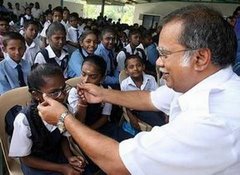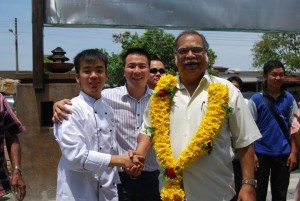 In a highly politicised environment like Malaysia, religious and race recognition is often seen as a zero sum game for the various races. Penang Deputy Chief Minister II and Perai state assemblyman (ADUN) Professor Dr. P. Ramasamy talks of how interfaith understanding and recognition of others is an asset that Malaysia has lost and how Penang is leading the way to restore it.
In a highly politicised environment like Malaysia, religious and race recognition is often seen as a zero sum game for the various races. Penang Deputy Chief Minister II and Perai state assemblyman (ADUN) Professor Dr. P. Ramasamy talks of how interfaith understanding and recognition of others is an asset that Malaysia has lost and how Penang is leading the way to restore it.
Non-Muslim Affairs and Road Signs
In February this year, Penang state formed an interfaith portfolio that looks into non-Muslim affairs. This portfolio is tasked to handle and promote interfaith understanding. The portfolio was upgraded from the Committee for Places of Worship under the Penang Island Municipal Council (MPPP). For now it acts as an advisory body to mediate and resolve non-Muslim issues in matters such as burial land and places of worship.
Predictably, UMNO has gone to attack us on this initiative as infringing on Muslim sensitivities. But they seem to have overlooked the fact that Perak under BN also has a non-Muslim religious affairs bureau. In any case, Penang recognises that promoting interfaith understanding and harmony is an inevitable reality in a multi-religious society like ours.
In addition, the state government has also placed a moratorium on demolition of any places of worship without the consent of the ADUN and Chief Minister.
Regarding the multi-lingual road signs policy, it is an effort by PR to showcase Penang and Malaysia’s rich cultural heritage. Penang has road signs in Jawi, Tamil and Chinese for the relevant named roads. The policy was initially opposed by UMNO’s racialist elements; In fact there was even a lawsuit brought up against this policy but the plaintiff decided to drop the case due to lack of funds.
This policy does not challenge the primacy of Bahasa Malaysia. The people have generally accepted the policy; many of them feel proud that there is an acknowledgement of the various communities’ presence and contribution in the nation building process.
Vernacular Education
 In terms of vernacular education, Ramasamy said PR has done what BN has not been able to do for more than 50 years, that is, in providing systematic annual funding for vernacular and missionary schools. Public support for PR in this policy has been the highest; the people here appreciate it very much.
In terms of vernacular education, Ramasamy said PR has done what BN has not been able to do for more than 50 years, that is, in providing systematic annual funding for vernacular and missionary schools. Public support for PR in this policy has been the highest; the people here appreciate it very much.
Though building and relocation of schools is a federal government responsibility, the state government has generously allocated many new and strategic locations for those affected schools. In all, since 2009 the Penang state government has provided more than RM 30 million to the various religious vernacular and missionary schools in the state.
“This has given much pressure on BN to keep up. In the last two years, the federal government has given RM 600,000 to a missionary school in Bukit Mertajam, which is unprecedented,” said the Batu Kawan Member of Parliament.
Tackling Core Issues
Like most marginalised communities, the Indian community faces challenges of poverty, lack of access to education and erosion of their religious rights. One of the areas PR has paid serious attention to is the Tamil schools.
A Penang Tamil Schools Special Taskforce Committee headed by Dato Dr K. Anbalagan has been established to oversee the Tamil education and 28 Tamil schools.
“Though most of these schools headmasters are under the control of BN, we don’t discriminate when it comes to aiding the schools. As most of these schools are of partially aided status, they are dependent on outside and government support,” said Ramasamy.
Since 2008, PR has provided systematic annual grants to Tamil vernacular schools. In all, the state government has provided RM 1.75 million in 2010 and 2011, the highest amount in the state’s history.
He also said that the state government has provided four plots of land for the existing Tamil schools to relocate to nearer and more convenient sites for the Tamil-speaking population areas. In fact one of the schools (SRJK (T) Azad) relocated now occupies a piece of prime land worth RM 13 million.
“Another area of concern is the lack of job opportunities for the Indian community. Currently around 13 percent of the state civil servants are Indians. The recruitments are a cumbersome process, as many of the recruitment staff still have to adapt to our aim to hire more inclusively in the state workforce.
“As chairman for Penang Development Corporation, I have had to reject its recent recruitment drives because the candidate list didn’t contain enough non-Malay candidates. We are dealing with an entrenched mindset here. In looking to right the racial imbalance in the public sector employment and with it, the provision of fairer and adequate chances for the Indian community, the process will take time,” he added.
Kg Buah Pala – Happy Ending
The saga of Kg Buah Pala was a sorry episode of how the poor were scammed and Pakatan was left holding the bag of bad press for not being able stop the demolition. The land ownership of the village estate was transferred stealthily to a developer without the knowledge of the new state government within the first week of PR coming to power. After many legal appeals, the courts ruled that the developer had the right to develop the land.
There was much drama at the height of the episode. Nine of the 24 families affected chose to stay put and barricade themselves, at the ill advice of MIC and Human Rights Party. Yet the bulldozers came nonetheless. Thanks to a relentless BN media spin and onslaught, Pakatan was blamed for a mess it did not create.
Fortunately for the other 15 families that agreed to the compensation scheme proposed by the state government, they now can look forward to occupying double-storey terrace houses worth more than RM 600,000 in Taman Buah Pala, the site of their original home, in October 2011. -The Rocket



